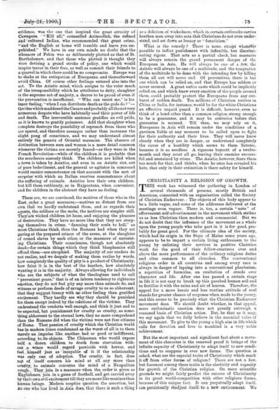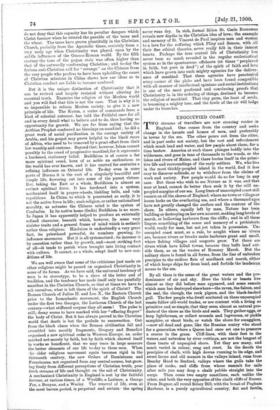CHRISTIANITY A RELIGION OF GROWTH.
TH"week has witnessed the gathering in London of several thousands of persons, mostly British and American, connected with an organisation called the Society of Christian Endeavour. • The objects of this body appear to be a little vague, and some of the addresses delivered at the meetings even vaguer. There is, too, a certain "note" of effervescent self-advertisement in the movement which strikes us as less Christian than modern and commercial. But we do not doubt that the influence of the movement as a whole upon the young people who take part in it is for good, pro- bably for great good. For the ultimate idea of the society, which had its origin in the State of Maine some years ago, appears to be to impart a certain living enthusiasm to the young by enlisting their services in positive Christian work for the good of their fellow-creatures over and above the mere performance of the ordinary religious duties and -rites common to all churches. The conventional religious order in all countries and among every race is always in danger of lapsing into a conventional pharisaism, a repetition of formulas, an exaltation of creeds over character and life. After one has passed a certain stage in life it is not easy, to break up this parched human soil and to fertilise it with the rains and air of heaven. Therefore, the appeal for a more heroic and less routine attitude of soul stands far greater chance of response when made to the young; and this seems to le precisely what the Christian Endeavour movement does. We should doubt whether, in that appeal, mere enthusiastic emotion does not greatly outweigh a reasoned basis ,of Christian action. But, be that as it may we say again that we fully believe in the essential value of this movement. To give to the young a high aim in life which calls for devotion and love to mankind is a very noble achievement.
But the most important and significant fact about a move- ment of this character is the renewed proof it brings of the infinite capacity of Christianity to adapt itself to new condi- tions and to reappear in ever new forms. The question is asked, what are the especial traits of Christianity which mark it off from other forms of religion? There are not a few, but foremost among these traits is the elasticity and capacity for _growth of the Christian religion. On mere scientific grounds we might fairly predict the success of Christianity in its great world-competition with other religious forms, because of this unique fact. It can perpetually adapt itself, call persistently I.-adjust itself. to a new environment. We do not deny that this capacity has its peculiar dangers which Christ foresaw when he uttered the parable of the tares and the wheat. The tares have grown plentifully in the Christian Church, probably from the Apostolic times, certainly from a very early age when Christianity was played upon by the subtle influences of the Graeco-Roman world. By the fifth century the tone of the pagan stoic was often higher than that of the outwardly conforming Christian ; and to-day the furious anti-Christian call for "revenge" on the Chinese from the very people who profess to have been upholding the cause of Christian missions in China shows how our ideas as to Christian conduct are liable to become confused.
But it is the unique distinction of Christianity that it can be revived and largely restated without altering its essential truth. Examine the religion of the Moslem world and you will find that this is not the case. That is why it is so impossible to reform Moslem society, to give it a new
principle of life. The Koran, a series of commands from a kind of celestial autocrat, has told the Faithful once for all and in every detail what to believe and to do, thus leaving no opportunity for growth. We are far from saying that the Arabian Prophet conferred no blessings on mankind; he did a great work of social purification in the corrupt society of Arabia, and his gospel may prove helpful to the black -races of Africa, who need to be removed by a great effort from their low worship and customs. Beyond that, however, Islam cannot possibly be the creed of progressive mankind, for it represents a hardened, stationary belief. Buddhism is of course a far more spiritual creed, born of as noble an enthusiasm as the world has ever known, and it has exerted for centuries a refining influence on Oriental life. To-day even in some parts of Burma it is the root of a singularly beautiful and simple life, flowering out into some of the purest virtues. But, taking the East as a whole, Buddhism is almost an extinct spiritual force. It has hardened into a system, mechanised itself in prayer-wheels, tinbling bells, and vain repetitions. In China, to which it penetrated so early, it is not the active force in life; such religion, or rather rationalised morality, as actuates the Chinese mind is the system of Confucius. In its native home (India) Buddhism is no more. In Japan it has apparently helped to produce an externally refined character, beneath which, however, lie some very sinister traits and a general frame of mind which is [esthetic rather than religious. Hinduism is undoubtedly a very great fact, its priesthood powerful, its numbers growing, its influence enormous. But it is all systematised; its increase is by accretion rather than by growth, and—most striking fact of all—it tends to perish when brought into living contact with culture. It cannot, as a whole, adapt itself to new con- ditions of life.
We are well aware that some of the criticisms just made on other religions might be passed on organised Christianity in some of its forms. As we have said, the universal tendency of man is to stereotype, to be a slave of the letter and of tradition, and the tendency has made itself only too painfully manifest in the Christian Church, so that at times we have to ask ourselves, what is left there of the spirit of Christ? The Roman Church of Julius II. and Leo X., the Eastern Church prior to the Iconoclastic movement, the English Church under the first two Georges, the Lutheran Church of the last century—what stiffened corpses they all seem! The pulse is still; decay seems to have marked with her "effacing fingers" the body of Christ. But it has always proved in the Christian world that death is but the prelude to resurrection. Out from the black chaos when the Roman civilisation fell and crumbled into mouldy fragments, Gregory and Benedict organised a new spiritual order in Western Europe, an order marked not merely by faith, but by faith which showed itself in works so beneficent, that we may trace in large measure the better elements of our life to-day to these men. When ;he older religious movement again becomes rigid in the thirteenth century, the new Orders of Dominicans and Franciscans, not organised from any central source, but grow. lug freely from different perceptions of Christian truth, pour fresh streams of life and thought on the soil of Christianity. A mechanised Christianity in England is met by the faithful fervour, at various times, of a Wycliffe, a Latimer, a George Fox, a Bunyan, and a Wesley. The renewal of life, even at the most barren period, is perpetual and certain • the spring
never runs dry. In rich, formal Milan St. Carlo Borromeo reveals new depths in the Christian idea of love; the example and memory of St. Vincent de Paul inspires men and women to a love for the suffering which Pliny and Seneca, with all their fine ethical theories, never really felt in their inmost• hearts. Perhaps the true central life of Christianity has never been so much revealed in the regular ecclesiastical system as in the spontaneous offshoots (at times "perplexed in faith, but pure in deed") of the spirit of faith and love which have grown into such mighty agencies for the xleliver7 once of mankind. That these agencies have penetrated every corner of the globe and have been found compatible with all manner of intellectual opinions and social institutions is one of the most profound and convincing proofs that Christianity is, in the ordering of things, destined to become the religion of mankind. That tiny germ, the least of seeds, is becoming a mighty tree, and the fowls of the air will lodge under its branches.



































 Previous page
Previous page